A woman’s diet plays an important role in regulating her health and the development of her baby. Choosing the right foods during this time is important for a healthy pregnancy journey. From leafy greens packed with essential nutrients to lean proteins that provide essential building blocks, our choices can greatly affect mother and baby. A balanced diet for pregnancy includes a variety of colorful fruits and vegetables, whole grains rich in fiber, lean proteins like chicken, fish, and legumes, and dairy products for calcium. It is important to avoid processed foods, high levels of caffeine, and raw or undercooked meats and make a proper pregnancy food chart. Pregnant women can nourish themselves and their growing babies for a healthy and happy pregnancy by focusing on nutrient-dense foods and maintaining a balanced diet. Let us check out some of the best foods to eat during pregnancy.
Table of Content
- List of Do’s & Dont’s During Pregnancy
- Pregnancy Diet Chart for 9 months
- Best Foods to Eat During Pregnancy & Their Nutritional Value
- Must-Have Foods in the Pregnancy Diet
- FAQ’s
List of Do’s & Dont’s During Pregnancy
Do’s
- Avoid both alcohol and tobacco.
- Avoid exposure to cleaning solvents, pesticides, lead, and mercury.
- Eat a balanced diet rich in folic acid, iron, and calcium.
- Maintain safe travel habits, including proper seat belt use.
- Set boundaries to reduce stress and prioritize relaxation.
- Aim for six to nine hours a day and make sure you get enough sleep.
- Incorporate regular exercise into your routine.
Don’ts
- Avoid taking any medications unless approved by your doctor.
- Stay away from strenuous activities that could put you at risk of falling or overheating.
- Avoid unpasteurized dairy products, soft cheeses, fish with mercury, or raw/undercooked foods such as fish and eggs.
- Stay away from heavy lifting and excessive bending.
- Avoid taking hot baths or using saunas, as high temperatures can injure or faint the fetus.
- If you are pregnant, stay away from radiation, including X-rays, which should be avoided.
Pregnancy Diet Chart to Follow
| First Trimester (1-3) | Second Trimester(4-6) | Third Trimester(7-9) | |
|---|---|---|---|
| Breakfast | Include Whole grains, Avocado. Tofu or Scrambled Eggs and add orange juice for Vitamin C | Mango or melon, Whole grain bread toast with nutty butter. Or a Whole grain cereal with healthy milk. | Fresh Orange Juice, Oatmeal, can have Greek yogurt and berries. |
| Mid-Morning Snack | Fruits & Dry Nuts | Handful of dry nuts & fresh juices | Handful of dried fruits, fresh fruits & juice |
| Lunch | Vegetable Salads & greens with chickpeas/grill Chicken for protein | Veggie salads, pasta/rice for carbs, deserts made from fresh fruits/berries | Grilled chicken/tofu for high protein. vegetable curry/soup/salad. |
| Afternoon Snack | Smoothies (avoid sugar) | Almonds, Dates | Whole grain cackers/ dry fruits |
| Evening Snack | Low fat yogurt | Bowl of fruits, grapes/berries | Bowl of fruits, grapes/berries |
| Dinner | Brown rice/rice with vegetable stew. And for some cooked veggies for protein source | Stir fried veggies, good bowl of rice. And some greens soup/curry | Veggies roasted/cooked. Soups, or roasted couscous(rava) with veggies |
Best Foods to Eat During Pregnancy
1. Dairy Products
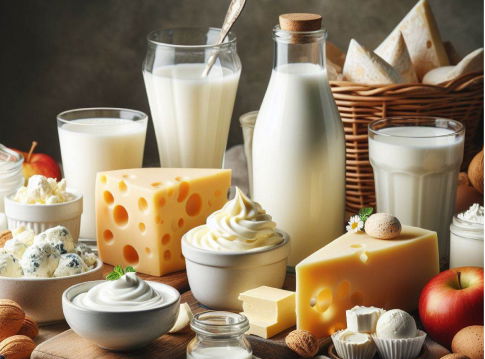
By adding dairy products to the diet of pregnant women, they can ensure they are getting essential nutrients like calcium and protein needed for their health and the growth of the baby.
Nutrition Value of Dairy Products:
During pregnancy, you will need extra protein and calcium to meet your baby’s needs. Dairy products like milk, cheese, and yogurt are good choices. Two types of protein are good in milk: casein and whey. Milk is an excellent source of calcium. It provides phosphorus, B vitamins, magnesium, and zinc. Yogurts contain probiotic bacteria in them, which will help in digestion.
Some Dairy Foods to Consume During Pregnancy:
- Low-fat or No-fat milk – Soy milk, almond milk, or Oat milk
- Yogurt – Greek or any flavored
- Cheese
Benefits of Eating Dairy Products During Pregnancy:
- Rich Source of Calcium: Dairy foods such as milk, cheese, fromage frais, and yogurt are important in pregnancy because they contain calcium, essential for bone and teeth.
- High protein: Pregnant women need more protein than usual to meet their baby’s needs, and dairy products are a good source of calcium and protein.
- Digestive Health: Yogurt, especially Greek yogurt, can be especially beneficial during pregnancy. Some strains also contain probiotic bacteria, which support digestive health, which is important during pregnancy. If you are a lactose intolerant person, then yogurt is the best option, you can mix fruits or also add it with your smoothies.
2. Lean meat
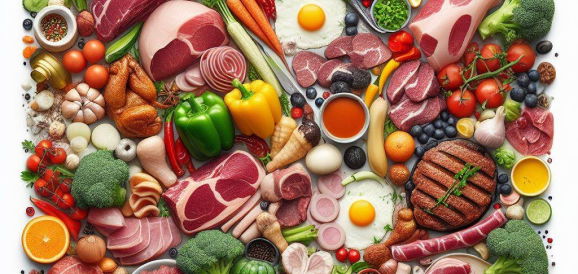
Lean meats like beef, pork, and poultry are not only high in protein but also provide essential nutrients like iron and choline, making them an important part of a balanced diet for pregnant women. Adding meat to the food of pregnant women can help meet increased nutritional needs during pregnancy, especially during the third trimester.
Nutrition Value of Lean Meat:
Lean beef, pork, and chicken are good sources of protein, iron, choline, and other quality B vitamins — all important during pregnancy. It has Protein, which is essential for developing every cell in the mother’s and baby’s bodies. Iron supports increased blood volume during pregnancy and prevents iron deficiency anemia, which can lead to complications such as low birth weight. Choline is important for the baby’s brain development. Vitamin B supports overall health and energy levels during pregnancy.
Some Lean Meat Foods to Consume During Pregnancy:
- Beef
- Pork
- Chicken
- Lamb
Benefits of Eating Lean Meat During Pregnancy:
- Iron absorption: Lean red meat helps increase iron absorption, which is important for preventing anemia and supporting normal blood counts.
- Blood sugar regulation: Protein in the meat helps stabilize blood sugar levels, prevent hunger, and provide a steady supply of energy.
- Brain development: Choline in lean meat helps the brain development of the baby.
- Total nutrients: Lean meat combines essential nutrients needed for a healthy pregnancy, including protein, iron, and B vitamins.
- Pairing with Vitamin C: Combining lean meats with vitamin C-rich foods, such as spinach or potatoes, increases the absorption of iron, increasing the nutritional benefits.
Suggestive Read: 10 Healthy Foods That Are Rich in Iron
3. Legumes

Legumes, including lentils, peas, beans, chickpeas, soybeans, and peanuts, are powerhouse foods for pregnant women due to their rich nutritional profile. Adding legumes into the diet of pregnant women such as hummus on whole grain toast, black beans in a taco salad, or a lentil curry ensures pregnant women receive the necessary nutrients for a healthy pregnancy.
Nutrition Value of Legumes:
Legumes are excellent sources of dietary fiber, which helps in digestion and preventing constipation. They provide plant-based protein a healthy alternative to animal proteins, if you are vegan or vegetarian then this is the best option to consume. A wonderful source of non-heme iron, which is easily absorbed when added to vitamin C-rich foods. Folate is of the utmost importance during pregnancy, especially in the first trimester, as it helps prevent neuromuscular defects. Legumes contain calcium, which is vital for developing strong bones and teeth in the fetus. This nutrient also aids in nerve function and muscle contraction for both the mother and baby.
Some Legumes to Consume During Pregnancy:
- Soybeans
- Lentils
- Chickpeas
- Peas
- Peanuts
Benefits of Eating Legumes during Pregnancy:
- Increased folate intake: Meeting the daily requirement for folate (600 micrograms) is important, and legumes help achieve this goal, reducing the risk of neural tube defects in the baby.
- Fiber Support: Legumes’ high fiber content helps promote healthy digestion, prevent constipation, and regulate blood sugar levels.
- Iron Absorption: Despite being plant-based, it provides iron, which is essential to prevent iron deficiency anemia during pregnancy.
- Nutrients: Legumes provide a variety of essential nutrients, including magnesium, potassium, and zinc, to support both maternal and fetal health
- Legumes are low in both saturated and total fats, which promote heart health, which is essential to support the increased demands on the cardiovascular system during pregnancy.
4. Broccoli and Dark Leafy greens
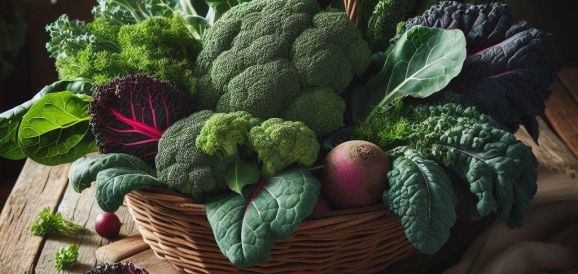
Broccoli, and dark green leafy vegetables, like kale and spinach, are healthy foods packed with essential nutrients essential to a pregnant woman’s diet. Aim for 400 to 800 micrograms of leafy greens daily, ensuring you receive the necessary nutrients for a smooth pregnancy journey.
Nutrition Value of Broccoli and dark leafy greens:
They have fiber which is essential for digestive health and preventing constipation. Rich in Vitamin C supports the immune system and aids in iron absorption. Vitamin K is important for blood and bone health. It contains Vitamin A which is important for vision, skin, and fetal development. Calcium is essential for bone and teeth development in both the mother and baby. Iron supports red blood cell production and prevents anemia during pregnancy. Folate (Folic Acid) in dark leafy greens is vital for preventing birth defects and ensuring proper neural tube development. Potassium helps maintain fluid balance and supports heart health.
Some Broccoli and dark leafy greens to Consume During Pregnancy:
- Broccoli
- Spinach
- Kale
- Lettuce
- Watercress
- Asparagus
- Bok Choy
Benefits of Eating Broccoli and dark leafy greens during Pregnancy:
- Support baby growth: They produce enough iron and folate, which are essential for baby growth and development during pregnancy.
- Rich in Antioxidants: These vegetables are loaded with antioxidants, protecting cells from damage and supporting overall health.
- High in fiber for digestive health: The high fiber content aids digestion, prevents constipation, and supports gut health, a common concern during pregnancy.
- Easy to Incorporate: Even if you don’t like the taste, you can easily disguise it in soups, pasta sauces, smoothies, omelets, or stir-fries to easily meet your daily nutritional needs.
5. Whole grains
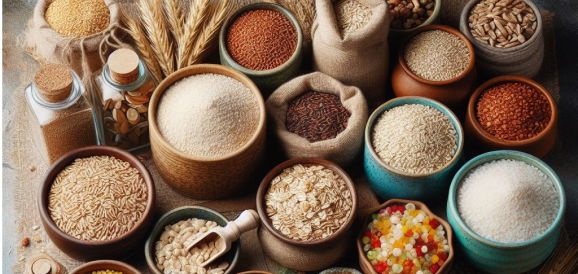
Nutritional Value of Whole Grains:
Whole grains, unlike their refined counterparts, are rich in essential nutrients important for pregnant women’s food choices. They are packed with fiber, vitamins, and plant compounds crucial for maternal and fetal health. Examples include oats, quinoa, brown rice, wheat berries, and barley. These grains contain not only carbohydrates but also significant amounts of protein, B vitamins, fiber, and minerals such as magnesium.
Some Whole Grains to Consume During Pregnancy:
- Brown rice
- Oatmeal
- Quinoa
- Barley
- Bulgur
Benefits of Eating Whole Grains During Pregnancy:
- High in nutrients: Whole grains provide essential nutrients such as fiber, folic acid, iron, B vitamins, and minerals that help the baby grow healthy.
- Fiber Content: Fiber in whole grains improves digestion, decreasing constipation—a common concern during pregnancy—while also increasing fullness and assisting in blood sugar regulation.
- Folic acid: Whole grains are a natural source of folic acid, an important nutrient for preventing birth defects in the baby’s tissues.
- Supports maternal health: Eating whole grains can help pregnant women maintain overall health, maintain a steady stream of energy, and support immune function.
- Iron Content: Whole grains like quinoa are rich sources, helping to produce red blood cells and preventing iron-deficiency anemia.
6. Sweet potatoes

Adding sweet potatoes into meals can be a delicious and nutritious addition to a pregnant woman’s diet. Whether as a stand-alone supplement or added to a variety of foods, sweet potatoes offer a range of benefits that support maternal health and fetal growth without the risks associated with vitamin A.
Nutritional Value of Sweet Potatoes:
A single sweet potato serves up more than 400 percent of the vitamin A that you need in a day, making it a powerhouse for pregnant women’s diets. This is especially important in the first trimester when rapid cell division occurs for fetal development. use. This is especially important in the first trimester when rapid cell division occurs for fetal growth. Sweet potatoes also contain beta-carotene, a plant compound that the body converts into vitamin A. Unlike supplements that contain excessive amounts of vitamin A, which can pose a risk of birth defects, sweet potatoes provide a natural and safe source of this essential nutrient.
Benefits of Eating Sweet Potatoes During Pregnancy:
- Fetal Development Support: Sweet potatoes provide a significant amount of beta-carotene, essential for a baby’s development. Vitamin A derived from beta-carotene is vital for the formation of various organs and body parts during pregnancy.
- High Fiber Content: As part of a balanced diet for pregnancy, sweet potatoes contribute to meeting the recommended fiber intake. Fiber aids in maintaining fullness, stabilizing blood sugar levels and enhancing digestive health. This can help alleviate pregnancy-related constipation, a common concern for expectant mothers.
- Healthy Energy Source: With their high carbohydrate content, sweet potatoes serve as an excellent energy source for pregnant women. Carbohydrates provide the necessary fuel for both the mother’s and baby’s energy needs during pregnancy.
Foods Pregnancy Women Should Have in Their Diet
-
Fruits – Must Eat During Pregnancy
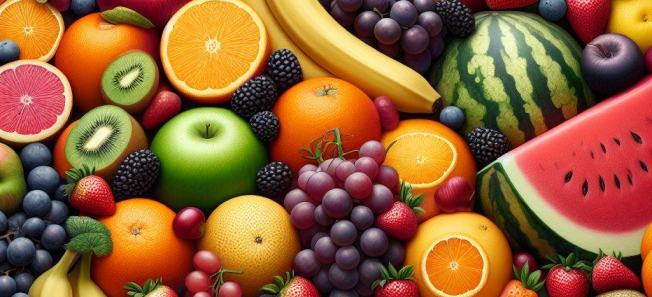
Fruits play an important role in a pregnant woman’s diet, providing many essential nutrients essential for maternal and fetal health. When added to a balanced pregnancy diet, fruits offer a wide range of benefits, which improve hydration, nutrient intake, and digestion. Make sure you get a variety of nutrients by eating at least five portions of a variety of fruits every day, whether fresh, frozen, canned, or dried, to ensure a diverse nutrient profile. Including these nutrient-dense fruits in meals, snacks, or smoothies helps pregnant women achieve their nutritional needs and promotes a successful pregnancy journey. Some important fruits that are important for pregnant women’s food are:
1. Oranges:
Oranges emerge as a standout choice due to their hydrating properties and rich nutritional content. hey are a good source of folate, which is important to prevent neuromuscular defects in the fetus. In addition, oranges boast high levels of vitamin C, facilitating iron absorption and offering antioxidant protection against cell damage.
2. Mangoes:
Mangoes present another powerhouse of nutrients, rich in vitamins C and A. Vitamin A plays a crucial role in improving the baby’s immune system and preventing complications. While enjoying the benefits of mangoes, moderation is key, especially considering their vitamin A content.
Suggestive Read: Health Benefits of Eating Mangoes
3. Avocado:
Avocados stand out for their amazing folate content, which is crucial for fetal development. They also provide plenty of vitamins, fiber, and minerals such as potassium and magnesium, which help relieve pregnancy symptoms such as nausea and leg cramps. Choline in avocados supports the baby’s brain and nerve development, emphasizing the importance of a pregnant woman emphasizes the importance of diet.
4. Lemons:
Not only does lemon provide a refreshing taste, but it also helps reduce nausea associated with pregnancy. High in vitamin C, it also helps with digestion and constipation, making it a valuable food or drink for pregnant women
5. Bananas:
Bananas emerge as a healthy source of potassium, which combats common pregnancy problems like crampy legs. Rich in vitamin B6 and fiber, they aid in digestion and may help alleviate nausea, providing a nourishing snack option for pregnant women.
6. Berries:
Berries, including blueberries, raspberries, and strawberries, provide many nutrients essential for maternal and fetal health. Carbohydrates in berries provide essential energy, fiber aids digestion, and folate supports fetal development. Phytonutrients like flavonoids offer antioxidant protection, emphasizing the importance of adding berries to a pregnancy diet.
7. Apple:
Apples stand out for their high fiber and vitamin C content, promoting digestive health and immune function. Pectin, a probiotic found in apples, supports gut health, further enhancing its nutritional value for pregnant women.
-
Must Eat Vegetables During Pregnancy

When it comes to maintaining a healthy diet during pregnancy, adding a variety of vegetables is very beneficial for both mother and baby. Vegetables are rich in essential vitamins, minerals, and fiber, making them a major part of a pregnant woman’s diet. Adding these vegetables to a balanced diet for pregnancy provides pregnant women with essential nutrients, promotes healthy fetal growth, and helps prevent complications such as gestational diabetes and nutritional deficiencies By forming a variety of fruits choosing colors, and adhering to the right amounts, pregnant women can nourish themselves and their babies for a healthy pregnancy journey here are some.
1. Beetroot:
Beetroots are a powerhouse of vitamins and fiber, making them an excellent choice for pregnant women. They are high in immune-boosting nutrients and fiber, which aids in digestion and helps prevent constipation, a common issue during pregnancy.
2. Green Peas:
Green peas are packed with vitamins C and K, along with fiber, making them a nutritious addition to a pregnant woman’s diet. They are also rich in folic acid, essential for fetal development and reducing the risk of genetic defects.
3. Cucumber:
Cucumbers are not only refreshing but also a rich source of water and fiber. They help keep the body hydrated and aid in digestion, making them an ideal snack for pregnant women, especially during hot weather.
4. Bell Peppers (Capsicum):
Bell peppers, particularly red ones, are loaded with vitamin C, vitamin A, and folate, crucial nutrients for a healthy pregnancy. They contribute to the overall nutritional intake and help in fetal development.
5. Tomatoes:
Tomatoes are abundant in vitamins C and K, biotin, and folate, making them a valuable addition to a pregnant woman’s diet. They support immune function, promote healthy skin, and aid in fetal development.
6. Parsley:
Parsley is rich in protein, vitamin E, and riboflavin, offering various health benefits for pregnant women. Its diuretic properties help reduce pregnancy-related swelling, and when consumed in moderation, it poses no harm during pregnancy.

-
Must Eat Dry Fruits & Nuts During Pregnancy
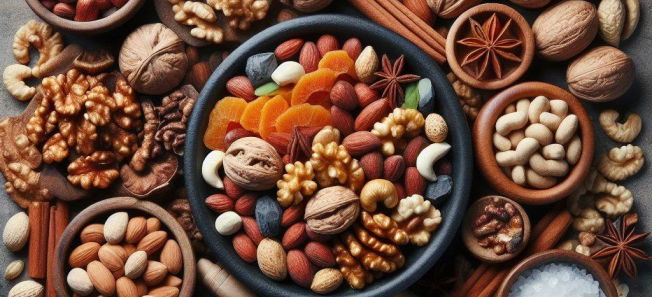
Nuts are small but mighty powerhouses, making them one of the best foods to include in a pregnant woman’s diet. Containing essential nutrients such as magnesium, zinc, potassium, vitamin E and protein, fiber, and healthy fats, nuts offer a wide range of benefits for mother and baby. They’re also incredibly convenient, providing a simple, on-the-go snack solution to curb pregnancy cravings. Including nuts in a pregnant woman’s diet not only fulfills cravings but also provides essential nutrients important for both maternal and fetal health. Whether enjoyed as a snack or added to meals, nuts offer a tasty and convenient way to optimize nutrition during pregnancy.
1. Almonds:
Almonds are a nutritional powerhouse, boasting calcium, magnesium, protein, riboflavin, and vitamin E. These nutrients play vital roles in fetal neural development, bone strength, and immune system support. Almonds also aid in reducing bad cholesterol levels, preventing heart disease, and regulating blood pressure, crucial for a healthy pregnancy.
2. Pistachios:
With their savory taste, pistachios offer pregnant women a rich source of fiber, monounsaturated fatty acids, copper, protein, and vitamins. These nutrients support skeletal and muscular development in the baby, boost immunity, and help regulate cholesterol and blood sugar levels, contributing to overall maternal health.
3. Cashews:
Cashews are nutrient powerhouses containing calcium, zinc, phosphorus, folic acid, iron, magnesium, and vitamin K. They aid digestion, prevent anemia, strengthen bones and joints, and regulate blood flow to the fetus, reducing the risk of complications like pre-eclampsia. Additionally, cashews support gum and teeth health, crucial during pregnancy.
4. Walnuts:
Rich in omega-3 fatty acids, vitamins, fiber, and proteins, walnuts are essential for brain and eye development in unborn babies. They help maintain blood pressure, regulate cholesterol levels, control weight gain, and prevent gestational diabetes, ensuring a healthy pregnancy journey.
5. Peanuts:
Peanuts are a healthier snack option, packed with polyunsaturated fatty acids, folate, and proteins. They support fetal growth, prevent heart problems, aid in weight gain, and provide energy for pregnant women. However, caution should be exercised if allergic to peanuts.
6. Raisins:
Raisins, also known as kishmish, are an excellent addition to a pregnant woman’s diet. They are packed with iron and dietary fiber, essential for combating anemia and promoting healthy digestion. Including raisins in daily meals can help meet the increased iron needs during pregnancy while preventing constipation. They offer a delicious and convenient snack option, and overnight-soaked raisins can be particularly beneficial for relieving constipation.
7. Fig:
Figs are a powerhouse of nutrients essential for pregnancy. They provide calcium, iron, magnesium, potassium, and phosphorus, supporting overall health and fetal development. Rich in fiber, figs aid digestion and alleviate constipation, a common discomfort during pregnancy. The folic acid content in figs contributes to fetal growth, while also helping to alleviate morning sickness. Incorporating figs into the diet can provide significant iron intake, crucial for preventing anemia during pregnancy.
8. Apricots:
Apricots are a nutritious addition to the pregnant woman’s diet, offering fiber, vitamin A, copper, and vitamin E. Their fiber content aids digestion and reduces constipation, while also boosting immunity. Apricots contribute to organ and muscle health, ensuring smooth functioning throughout pregnancy. Importantly, they help maintain stable blood sugar levels, reducing the risk of gestational diabetes—a common concern among pregnant women. Enjoy apricots in various forms, such as milkshakes or cereals, for a tasty and healthy treat.
9. Dates:
Dates play a significant role in supporting pregnancy and childbirth. There are several top date brands in India you can rely on to find healthy and fresh dates to eat. They promote muscle growth, particularly around the uterus, facilitating a smoother delivery process and reducing postpartum bleeding. High in magnesium, dates aid in constipation relief and gut health regulation, while also preventing anemia. Consuming dates regularly helps satisfy nutritional needs and pregnancy cravings, providing a sweet and nutritious option for expectant mothers.
Suggestive Read: Best Dry Fruit Companies in India
Frequently Asked Questions on Pregnancy Diet
1. Which are fruits not to eat during pregnancy?
Always try to avoid and not eat these fruits during pregnancy – Papaya, Pineapple, and grapes in high quantities.
2. Can I eat Kiwi during pregnancy?
Yes, Kiwi can be consumed during pregnancy as it contains Vitamin K, Vitamin C, and high fiber nutrients which are very healthy for the body. Also, remember to take it in a moderate diet plan don’t consume it at a time.
3. Which time of the year is best for pregnancy?
Winter and spring are the most recommended by researchers to get conceived as the weather would be moderate and you can avoid the heat as it will make you uncomfortable in giving birth.
4. Can Walnuts be eaten during pregnancy?
Walnuts are a good source of omega-3 fatty acids, they help in the development of a baby’s brain and give a good amount of strength for the mother with protein and fiber.
5. What not to eat during the first trimester of pregnancy?
Avoid excess intake of Vitamin A, alcohol, tea/caffeine, and Dairy products in excess quantity.
6. Can one drink alcohol during pregnancy?
Exposure to alcohol during pregnancy is a known cause of fetal alcohol spectrum disorders (FASDs), which can result in a range of physical, behavioral, and intellectual disabilities in the baby. So, it’s professionally recommended not to consume alcohol during pregnancy.
7. Which are the best foods to eat and gain weight during pregnancy?
Always keep yourself hydrated, go for iron-rich foods, and healthy vegetables and whole grains. Carbs are essential but maintain a food diet chart. Go for healthy fats and consume them accordingly.
Conclusion
In conclusion, a well-rounded diet for pregnancy is important for the health and well-being of the expectant mother and her baby. By including fiber-rich foods such as green vegetables, lean proteins, and colorful fruits in a pregnant woman’s diet, she can ensure that she meets her nutritional needs and supports healthy fetal development more than any other. By focusing on healthy, balanced eating and avoiding harmful substances, pregnant women can nourish themselves and their growing babies for a healthy pregnancy journey.


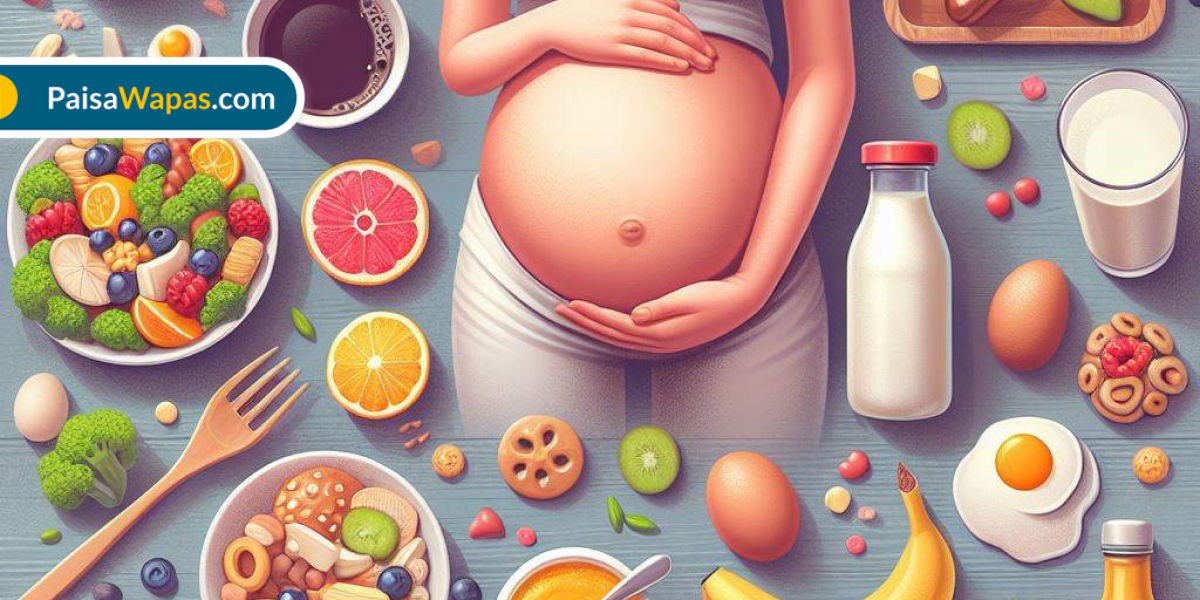




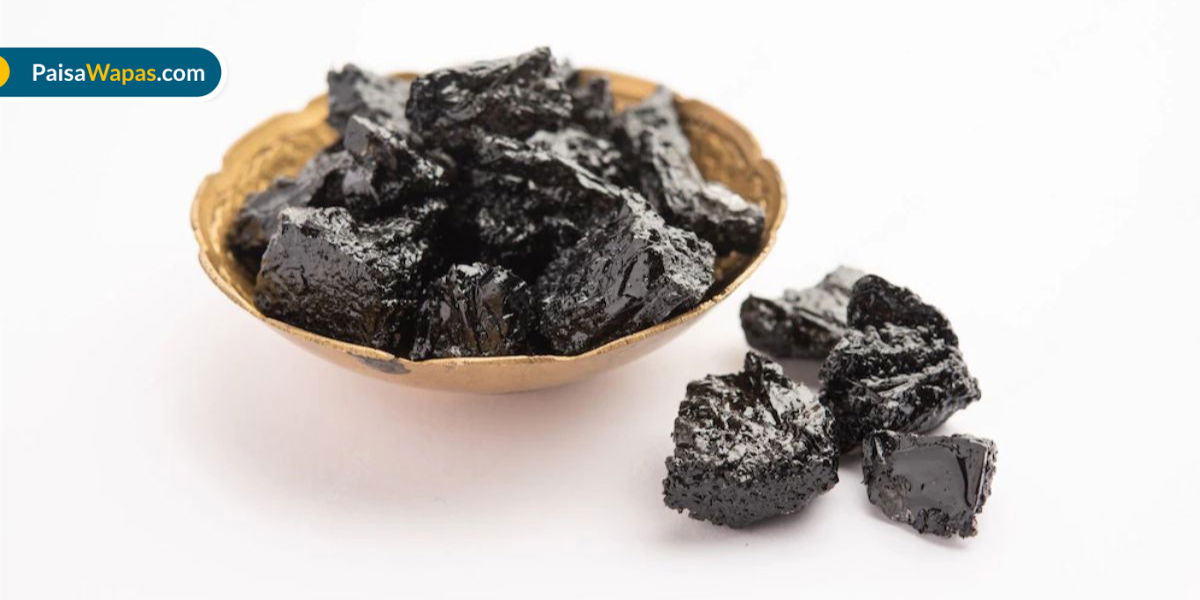

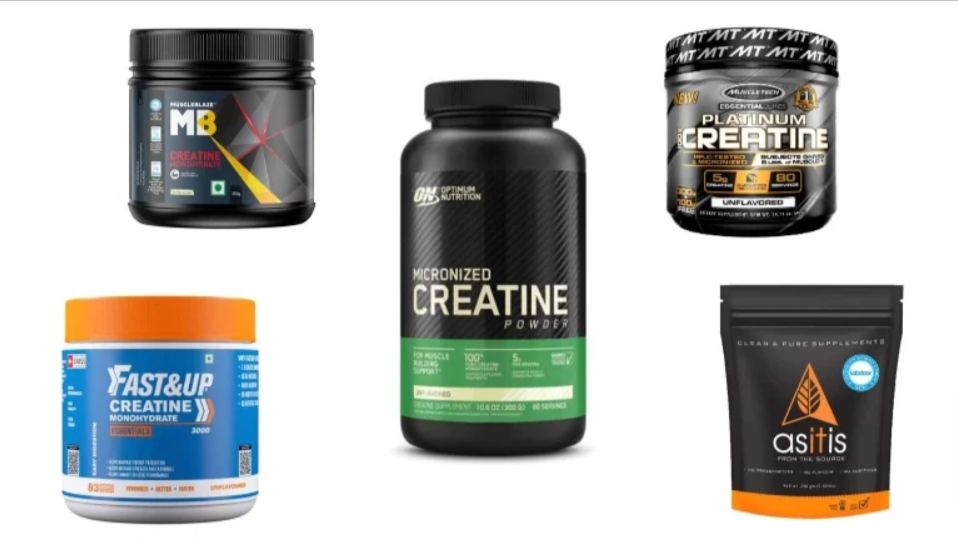


Add Comment